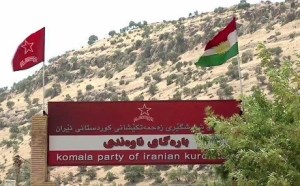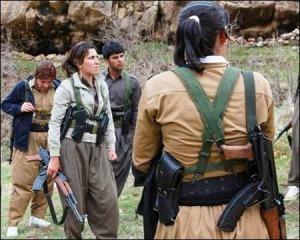nsnbc : The Iranian – Kurdish Komala party confirmed that Iranian Revolutionary Guards had killed three of its militants after the Guard announced it had killed “three terrorists”. The incident happened within the contact of increased, alleged anti-ISIS” operations in predominantly Kurdish Iranian regions following an attack in parliament in Tehran earlier this month.
 On Friday, June 24, Komala issued a statement, confirming that their Peshmerga were “ambushed” by Iranian forces early Friday morning in Sanandaj, the capital of Iran’s Kurdistan province. “ Komala also confirmed that there of their “colleagues were killed.”
On Friday, June 24, Komala issued a statement, confirming that their Peshmerga were “ambushed” by Iranian forces early Friday morning in Sanandaj, the capital of Iran’s Kurdistan province. “ Komala also confirmed that there of their “colleagues were killed.”
The party identified the three killed as Sabah Hussein Panahi, Hamid Saif Panahi, and Behzad Nouri. Komala also claimed they had killed and injured a number of Iranian forces in the incident.
Iranian Revolutionary Guards, for their part, reported that they had “killed three terrorists” and arrested another one in clashes in the northwestern, predominantly Kurdish region.
Komala did not provide any details about the possible arrest of one of their members in their statement. The Iranian operation is part of a larger security operation that mainly concerns Iran’s northwestern and southern provinces on the heels of a deadly attack by ISIS on the Iranian parliament earlier this month.
In May 2017 the Komala Party of Iranian Kurdistan (a.k.a. Komala) announced that it has begun to post Peshmerga fighters and the Iranian border with Iraq’s Kurdistan Autonomous Region. It is after nearly 25 years, and within the context of the recent Kurdish revival in Syria, Turkey, Iraq as well as Iran that Komala resumed the armed struggle.
Most Komala troops are currently stationed less than one kilometer from northwestern Iran. Komala noted that the proximity to the border allows their fighters to have more ready and easy access to Iranian territories.
The Komala Party of Iranian Kurdistan first declared its armed struggle against Iran after the Islamic revolution in 1979. Komala signed an alliance agreement with the Democratic Party of Iranian Kurdistan, or HDKA in 2012, a more active armed party that has engaged on a number of occasions since 2015 when they resumed their armed struggle after decades.
The two parties cooperate and coordinate in the field despite their political differences. Although nsnbc cannot independently verify the claim, Komala and the HDKA are said to man a 60 kilometer long stretch of border between Iraq and Iran.
The Kurdistan Democratic Party – Iran also resumed its armed struggle in 2016 and there has been an increase in clashed between the KDP-I and Iranian Revolutionary Guard units.
Komala, can trace its roots to the Communist Party of Iran but it has undergone several schisms. After Iran’s 1979 revolution Komala began its armed struggle against the new clerical Islamist regime. In the early days, it was known as the Tailors Revolutionary Group of Iranian Kurdistan.
In 1983, the leaders of Komala, together with some Iranian communist activists, established the Communist Party of Iran and Komala became the branch of the party in Kurdistan.
However, in 1991, a group broke off and established the Workers Communist Party. In 2000, the party experienced another split. A group broke off and established Komala. In recent years, yet another group walked away and formed the socialist party.
The PJAK group or (Party of Free Life of Kurdistan), which is considered as one of the most active Iranian Kurdish groups, is a militant Kurdish nationalist group based on the border areas between Iraq’s Kurdistan region and Iran’s Kurdish region. It has been carrying out attacks Iranian forces in the Kurdistan Province of Iran (Eastern Kurdistan) and other Kurdish-inhabited areas.
Since 2004 the PJAK took up arms to establish a semi-autonomous Kurdish regional entities or Kurdish federal states in Iran. The PJAK has over 3,500 armed militiamen, half the members of PJAK are women.
All of the Kurdish – Iranian armed groups agree that the Islamist government, after it came to power in 1979, imposed discriminatory rules, laws, and restrictions against Kurds in all social, political and economic fields – with the exception of a few who would adjust to the “Islamic Revolution”.
Iran’s Kurdish minority live mainly in the west and north-west of the country. Kurdish rights activists and party activists in Iran have consistently reported measures aimed to destroy their cultural identity, and to marginalize, oppress or punish those who “won’t adjust”.
Among typically cited complaints are clerical oppression with regard to registering certain Kurdish names, deprivation with regard to access to adequate housing and political rights and poverty that further marginalizes them, oppression with regard to access to employment, arbitrary arrest and prosecution of rights advocates, journalists and political activists, torture, and in some cases trials on trumped-up charges and execution.
CH/L – nsnbc 24.06.2017
Source Article from https://nsnbc.me/2017/06/24/iran-revolutionary-guard-killed-three-kurdish-peshmerga-during-alleged-anti-isis-operation/
Related posts:
Views: 0
 RSS Feed
RSS Feed

















 June 24th, 2017
June 24th, 2017  Awake Goy
Awake Goy 











 Posted in
Posted in  Tags:
Tags: 
















